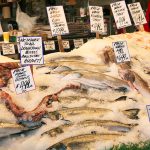Fishy business

A broad examination of seafood mislabeling and the ecological and financial impacts suggests that because of the mislabeling, more people are eating more sustainably.
Graduate students in the School of Aquatic and Fishery Sciences discovered that when fish are mislabeled, the real fish are often more affordable and from fisheries less in danger of overfishing. Most fish go through several points of distribution before reaching the consumer or restaurant.
The study found the mislabeling often happens somewhere between the port and the consumer and that the fish most likely to be mislabeled include croakers, shark catfish (basa), sturgeon and perch. Read more at UW Today.